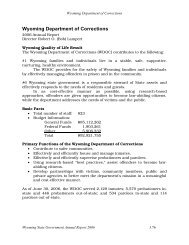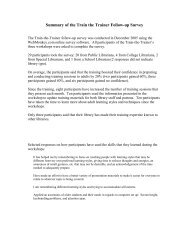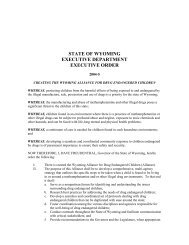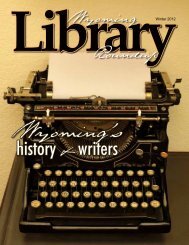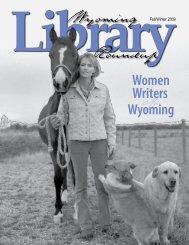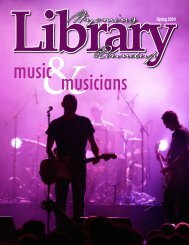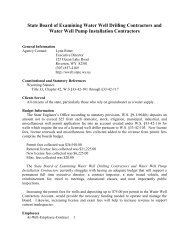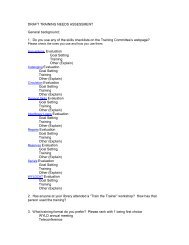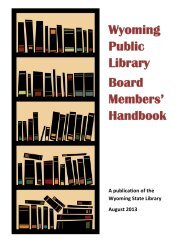Summer 2007 - the Wyoming State Library
Summer 2007 - the Wyoming State Library
Summer 2007 - the Wyoming State Library
- No tags were found...
Create successful ePaper yourself
Turn your PDF publications into a flip-book with our unique Google optimized e-Paper software.
Festival bringsauthor homePoet and author Paisley Rekdal neverwanted to tackle <strong>the</strong> issue of race. Shenever vowed to put people in her biracialshoes. She never even knew it was an issueto her.“Most of my life I never thought aboutit at all,” she says.She says it must have been an issue toher, even if she didn’t know it. Whileattending graduate school in Michigan,she realized it was a big deal to her and too<strong>the</strong>rs.“I didn’t show up to this party someonewas throwing in <strong>the</strong> graduate department.I found out I’d only been invited becauseI was biracial and that later people werefurious at me for not showing up. Theythought I didn’t show up because I wasn’tsupporting my race. I just thought it wasano<strong>the</strong>r dumb party,” Rekdal says.It was a rude awakening, she says. “Racereally matters to everyone and in bothstupid ways like this party and importantways.”It is this issue and many o<strong>the</strong>rs thatRekdal explores through both her prosand poetry.Rekdal’s newest work, The Invention of<strong>the</strong> Kaleidoscope: Poems, still touches on racebut focuses more on failures: failuresin relationships, science and artisticexpression.“Toward <strong>the</strong> end it’s about how<strong>the</strong>se failures can be successes if youunderstand that this sort of perfection isimpossible,” she says.The title poem tells of <strong>the</strong> man whoinvented <strong>the</strong> kaleidoscope as a way tobring his death and fragmented familytoge<strong>the</strong>r by <strong>the</strong> invention of this toy. At<strong>the</strong> same time, Rekdal says, <strong>the</strong> poem isabout a bad relationship she had with aman who was trying to make her more orless American.“The book is really about a lot ofthings,” Rekdal says.The poetry she’s writing now hasher “obsessed.” Sheis crafting poemsand a photo albumbased on <strong>the</strong> work ofEdward Curtis, whophotographed NativeAmerican Indians at <strong>the</strong>turn of <strong>the</strong> twentiethcentury.“I was struck byhow beautiful <strong>the</strong>photographs were, and<strong>the</strong> more I researched,<strong>the</strong> more I found outabout this adventurous,self-educated man and<strong>the</strong> controversy surrounding <strong>the</strong>se iconicphotographs.”Curtis believed <strong>the</strong> Native Americanswere a “vanishing race,” but Rekdal saysstudies show <strong>the</strong>y were instead marryingand becoming a mixed race.“He wanted to try to preserve <strong>the</strong> ideaof <strong>the</strong> au<strong>the</strong>ntic Native American Indianand because of that he sort of stagedmany of his photographs—which manypeople may or may not know,” she says.Being biracial, Rekdal says this questionof au<strong>the</strong>nticity really frustrates her.“This comes back to what does it meanto be au<strong>the</strong>ntic? How do you get countedin <strong>the</strong> end? Are you ano<strong>the</strong>r branchingout of <strong>the</strong> au<strong>the</strong>ntic race or are you yourown race?” she says.Rekdal says: “Most of my poemscome from a combination of intensepersonal experience but also that personalexperience incorporates intellectualexperience too.”To her, poetry is a very privateexpression in more ways than one. For awriter, it’s a private expression that’s sentout to <strong>the</strong> public, but at <strong>the</strong> same time, <strong>the</strong>poetry is read by <strong>the</strong> public in very privateways.“Each person takes a little somethingaway from <strong>the</strong> poem. Each personexperiences it in a different way andgets to claim someone else’s very privatelanguage as <strong>the</strong>ir own feelings too,” shesays.“Everyone says no one’s reading poetry.I’m reading it.”Rekdal is an associate professor at <strong>the</strong>University of Utah. Her works includea book called The Night My Mo<strong>the</strong>r MetBruce Lee and three collections of poems:A Crash of Rhinos, Six Girls without Pants,and The Invention of <strong>the</strong> Kaleidoscope: Poems.She has received a Village Voice Writerson <strong>the</strong> Verge Award, an NEA Fellowship,<strong>the</strong> University of Georgia Press’Contemporary Poetry Series Award, aFulbright Fellowship, several PushcartPrize nominations, and <strong>the</strong> LaurenceGoldstein Poetry Prize from MichiganQuarterly Review. Her poems and essayshave appeared in or are forthcomingfrom The New York Times Magazine, Nerve,Ploughshares, Poetry, Michigan Quarterly Review,Denver Quarterly, Black Warrior Review, NewEngland Review, Virginia Quarterly Review,Prairie Schooner, Tin House, Quarterly West,and on National Public Radio amongo<strong>the</strong>rs.Speaking: 12:45 p.m., Saturday, Poetry TentBook signing: 10:30 p.m., SaturdayPanel: Poetry Panel, 2:15 p.m., Saturday,Poetry Tent<strong>Wyoming</strong> <strong>Library</strong> Roundup • <strong>Summer</strong> <strong>2007</strong> 25



